
A Commitment to Excellence
Part Number: PL-3210 (Revised 03.10.05)
California Collection
™
Owners Manual
and
Installation Instructions
®
52CT

2
READ AND SAVE THESE INSTRUCTIONS
Before beginning installation of your new
Concord
®
ceiling fan,
read and follow these safety precautions. If you are not familiar
with national and local electrical codes and basic electrical wiring
procedures, we recommend that you have a qualified electrician
install your new ceiling fan.
Before you begin, TURN OFF THE ELECTRICITY. Determine which cir-
cuit your new fan will be using and remove the fuse or turn off the circuit
breaker at the main electrical panel.
Make sure that all wiring conforms to national and local electrical codes. If
you are in question, obtain a copy of the codes and wire the fan according-
ly. Never leave bare wires uncovered (wire connection), use wire nuts to
cap all connections. Plastic electrical tape is not recommended.
When working with electricity, never take short cuts. Follow the code in
every respect. Basic requirements for a ceiling fan installed with lights are,
120 volts AC - 60Hz, on a grounded circuit with a 15 amp breaker or fuse.
Make sure that your electrical system and choice of location meet these
requirements.
If the location where you plan to install your fan does not already have an
electrical outlet, hire a licensed electrician to run the wiring and install an
outlet box designed for ceiling fans or heavy fixtures. The outlet box
should be able to support a minimum moving weight of 50 pounds and
marked “Acceptable for Fan Support” (Plastic outlet boxes are not recom-
mended for ceiling fan installation).
If you plan to use an existing electrical location, check to make sure that the
outlet box is not PLASTIC, that it is securely attached and able to support
at least 50 pounds of moving weight and marked “Acceptable for Fan
Support”. If you have any questions, outlet boxes and support systems for
ceiling fans are available at most hardware and do-it-yourself centers. In
most cases, your
Concord
®
dealer will have all the necessary products
for the proper and safe installation of your ceiling fan.
The location you choose should have a minimum clearance of 20 inches
from any wall to the blade tip at any point in its rotation and a minimum of
7 feet from blade level to floor and 10 inches from the blades.

3
This ceiling fan was not designed for installation in any location where it
might be exposed to moisture or high humidity. Installation in this type of
location could be unsafe, will most likely damage the fan and its finish
.....and WILL VOID YOUR WARRANTY.
Every effort has been made to provide you with proper instructions for the
safe installation of this ceiling fan. You could however, encounter situa-
tions or problems not covered in this manual. Should this occur, please
refer to a do-it-yourself wiring handbook or hire a qualified electrician to
install your fan.
Never attach the blades to your ceiling fan before the fan body is properly
mounted on the ceiling.
Lubrication of your new ceiling fan is not necessary. The ball bearings have
been adequately charged with grease and permanently sealed at the factory
so that, under normal conditions, further attention is not necessary.
Look for Me!
I have safety Tips and
Ideas for installation
To reduce the risk of fire, electrical shock, or personal injury,
mount this fan to an outlet box marked “Acceptable for Fan
Support” and use the Mounting Screws provided with the outlet
box. CA
UTION:
Install the primary mounting means and use
only the hardware provided with the fan.
To reduce the risk of personal injury take care not to bend
the
blade carriers. Be careful not to insert foreign objects into rotat-
ing fan blades.
The important safeguards and instructions appearing in this
manual are not meant to cover all possible conditions and situa-
tions that may occur. It must be understood that common sense,
caution and careful attention to detail are factors which cannot
be built into this product. These factors must be supplied by the
person or persons installing, caring for, and operating the unit.

4
Loosen the two canopy mounting screws on the
downside face of the mounting bracket. Back
them out about half way. This will allow for
easier installation of the ceiling canopy later.
Install the mounting bracket to the electrical
junction box in the ceiling. Using two (2)
machine screws, two (2) washers, and two (2)
lockwashers (see figure 2).
The mounting bracket has slotted holes to enable
it to move sideways for proper alignment. Make
sure the mounting bracket is centered over the
electrical junction box and that it is securely
attached (see figure 3).
NO MOVEMENT SHOULD OCCUR
BETWEEN THE MOUNTING BRACKET AND
THE ELECTRICAL JUNCTION BOX.
Step 1 Attach the mounting bracket
Have you
TURNED OFF
the Electricity?
This fan is shipped with 2 downrods. 6” for regular ceil-
ing application and 2” for low ceiling application.
Choose the one that fits your need.
Slotted Holes
Junction Box
Canopy Mounting
Screw
Fig. 1
Fig. 2
Fig. 3

5
Fig. 4
Fig. 5
Half Ball Hanger
Support Rod Coupler
Ceiling Canopy
Fan Motor
Assembly
Motor Leads
Safety Pin
Threaded end of
Support Rod
Support Rod
Set Screws
Retaining Clip
& Washer
If you are using an extended support rod,
(longer than the one supplied with your fan)
remove the half ball from the support assem-
bly and attach it to the extended support rod
at this point. Make sure to retighten the set
screw and insert the safety pin.
Back off (loosen) the set screws (2) in the sup-
port rod coupler until the inside of the channel
is clear of the screw tip.
Remove and save the safety pin on the end of
the support rod assembly.
Place the ceiling canopy face down (small end)
over the support rod coupler on the motor hous-
ing.
Feed the electrical wires from the fan housing
through the support rod.
Thread the support rod into the support rod cou-
pler until the safety pin can be inserted through
the hole in both the rod and coupler.
Insert the safety screw through the hole in the
support rod coupler and support rod then attach
the washer and retaining clip on the other side.
Tighten both set screws and safety screw on the
support rod coupler.
Pull the electric wires in the junc-
tion box down through the mount-
ing bracket then bend them up and
back out of the way. Place the
black wire to one side and the white
and ground wire to the other side (see figure 4)
The wires should be off to the side and up against
the ceiling. This will leave the mounting bracket
open and ready to receive the ceiling fan.
Step 2 Attach the support assembly

6
Fig. 6
Notice the half ball on the end of the support rod
is grooved down one side (see figure 6). This
Keyway fits over the small keyway pin on the
inside of the mounting bracket and keeps the
ceiling fan from spinning on the mounting
bracket.
Using your step ladder, lift the fan and place the
half ball in the center of the mounting bracket
with the keyway pin inserted into the keyway on
the ball. Turn the fan left and right slightly to
make sure it is seated on the bracket with the
keyway pin in the keyway (see figure 7).
Trim the lead wires, leaving about six inches of
each wire extending from the support rod (see
figure 8).
Step 3 Hanging the Fan Body
Mounting Bracket
Keyway Pin
Ball Hanger
Support Rod
Mounting
Bracket
Keyway Pin
Ball Hanger
Support Rod
Ground Wire
Support Rod
Ball Hanger
Fig. 7
Fig. 8

7
Fig. 9
Fig. 10
Green
White
Black
Blue
Green
White
Black
Blue
Attach the GREEN wire (connected to the half
ball) to the GROUND
wire in the junction box.
The GROUND wire is usually a bare copper
wire without plastic insulation. It could also be
covered in green plastic insulation.
Attach the BLACK wire and
BLUE wire from
the ceiling fan to the BLACK
wire in the junc-
tion box.
Attach the WHITE wire from the ceiling fan to
the WHITE
wire in the junction box.
Fold the connected wire (see figure 10) and push
them up inside the electrical junction box with
the BLACK and BLUE wires to one side and the
WHITE and GREEN to the other side. Make
sure the wire nuts do not come loose during this
operation.
Making the electrical connections
To operate your ceiling fan with the pull chain(s)
and switches mounted on your fan, follow the
instruction below (see figure 9).
If you require or would like to
use a different method of con-
trolling your fan, refer to the
Optional Electrical Wiring
Procedures on page 10.
Each of the above connections
should be made as tight as pos-
sible using the proper size plas-
tic wire nuts. Plastic electrical
tape is not recommended for
these connections.

8
Slide the ceiling canopy up into place over the
ceiling mounting bracket (see figure 11). The
two screws on the mounting bracket face
should slip through the key hole slots in the
canopy. Rotate the canopy slightly and then
tighten both screws.
Step 4 Install the ceiling fan
If you are using the Flush Mount System, skip
this step.
Depending on how deep the
electrical junction box was
installed in the ceiling, you
might have a slight gap
between the ceiling canopy
and the ceiling. Junction
boxes are commonly installed at different
depths in the ceiling, so we have designed the
mounting bracket and ceiling canopy to allow
for this.
Attach each fan blade to a blade arm with three
washer head screws and three screw pads (see
figure 12). Each screw is passed through the
screw pad, then the blade and screwed into the
blade arm.
Screws should be tightened until the screw
pads are compressed. Hold the blade arm dec-
orative side down and place the blade on top
with your choice of finish facing down.
Step 5 Blade And Blade Arm Assembly
This fan is supplied with a reversible blade
finish. Choose the blade finish that you
prefer and attach as follow:
Fig. 11
Fig. 12
Support Rod
Canopy Screws
Ceiling Canopy
Screws and Pads
(3 per blade)
Motor Housing
Pre-Installed
Screws to
Blade Arm
Fig. 13

9
Fig. 14
Fig. 15
4 or 5 Blade Pattern
Switch Housing
Connector
Motor Housing
Connector
Reverse Switch
Three Speed
Switch
(pull chain)
Fig. 16
Remove the large screws in the face of the
motor. Discard any rubber blocks attached to
these screws. The rubber blocks are installed at
the factory to stabilize the motor during ship-
ment.
You have the choice of using 4 or 5 blades (see
figure 14).
Select the correct mounting pattern and attach
each blade to the motor face using pre-installed
screws (see figure 13). Take care not to bend the
blade arms during installation. This will cause
your fan to wobble while running.
Step 6 Blade Assembly Installation
Try mounting the blades on
opposing sides of the motor
face. This will help keep the
fan more level during blade
installation.
Back off (loosen)the three screws on the electri-
cal housing mounting plate attached to the
motor shaft (see figure 16).
A color coded wire connector (female) is locat-
ed inside the electrical switch housing (see fig-
ure 15), a male connector extends from the
mounting plate. Align the colors on each con-
nector and push them together. The connectors
are also notched and will connect only when the
colors are aligned.
The switch housing has three slotted holes
around the top. Align these holes with the three
screws on the mounting plate. Push the switch
housing up and rotate to the right so the screws
are at the far left of the horizontal slot.
Tighten each screw.
Step 7 Electrical Switch Housing Installation

10
Fig. 17
Fig. 18
Fig. 19
Fan controlled with wall switch and Light controlled at fan.
Fan controlled at fan with Light controlled at wall switch.
Fan & Light controlled by wall switch or switches.
Check that all safety pins, set screws and con-
nections are properly in place and tight.
Check blade clearance and rotation.
Attach the decorative pull chain tassel(s) to the
switch housing.
Located on the side of the switch housing is a
slide switch. This switch controls the direction
of blade rotation. The UP position sets the
blades in reverse rotation (air moves UP). The
DOWN position sets the blades in forward rota-
tion (air moves DOWN). Make sure this switch
is all the way UP or DOWN, your fan will not
run if it is in the middle.
Step 8 Final Checks
Illustrations in figures 17, 18 and 19 show
optional wiring diagrams that you can use.
ONLY USE AN OPTIONAL WALL
SWITCH THAT HAS BEEN DESIGNED
FOR USE WITH CEILING FAN
Your dealer carries a number of
different types of wall switches
that have been designed and
tested for use with our products.
To obtain the best performance
electrical components should
be matched for output, for that
reason, we only recommend the use of wall
switch(s) that your dealer provides.
If you elect to control the motor of your ceiling
fan from a wall switch, remember that the wall
switch will only turn your fan on and off. The
speeds can be adjusted at the fan.
If you elect to control the speeds of your ceiling
fan from a wall switch, YOU MUST set the
speed switch on the ceiling fan to HIGH speed
and leave it in that setting.

11
Your new ceiling fan is now ready to use. Reset your circuit breaker
and restore power to the circuit. See the Operation Instruction below
to review the function of each control on your fan.
The pull chain located on the switch housing (see figure 16) controls
the speeds of your fan. When the fan is off, pull the chain once for
HIGH speed, twice for MEDIUM speed, three times for LOW speed
and fourth time to turn it OFF again.
The slide switch located on the switch housing (see figure 16) controls
the direction of blade rotation. The UP position sets the blades in
reverse rotation (air moves UP). The DOWN position sets the blades
in forward rotation (air move DOWN).
Your fan requires very little maintenance. Cleaning of the housing
should be done with a damp soft cloth, NO CLEANING AGENTS.
On the blades, use a duster or dry cloth because any moisture could
cause the blade to warp.
Maintenance
Operation Instructions

-
 1
1
-
 2
2
-
 3
3
-
 4
4
-
 5
5
-
 6
6
-
 7
7
-
 8
8
-
 9
9
-
 10
10
-
 11
11
-
 12
12
Concord Fans 52CH5SN Installation guide
- Category
- Household fans
- Type
- Installation guide
Ask a question and I''ll find the answer in the document
Finding information in a document is now easier with AI
Related papers
-
 Concord Fans 60RS5ST Operating instructions
Concord Fans 60RS5ST Operating instructions
-
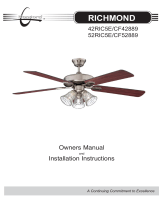 Concord Fans 42RIC5EST Installation guide
Concord Fans 42RIC5EST Installation guide
-
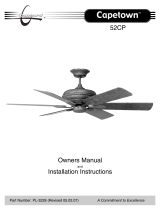 Concord Fans 52CP6ORB Installation guide
Concord Fans 52CP6ORB Installation guide
-
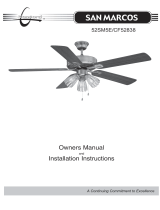 Concord Fans 52SM5EST Installation guide
Concord Fans 52SM5EST Installation guide
-
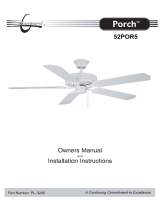 Concord Fans 52POR5WH Operating instructions
Concord Fans 52POR5WH Operating instructions
-
Concord Fans 60AC5ORB Installation guide
-
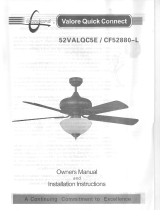 Concord Fans 52VALQC5EWH Installation guide
Concord Fans 52VALQC5EWH Installation guide
-
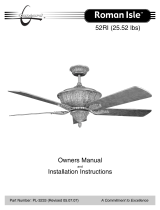 Concord Fans 52RIC5EST Installation guide
Concord Fans 52RIC5EST Installation guide
-
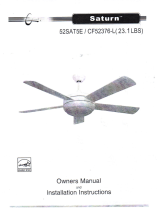 Concord Fans 52SAX5EST Installation guide
Concord Fans 52SAX5EST Installation guide
-
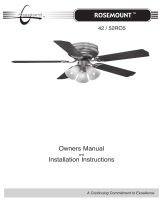 Concord Fans 42RO5SN Operating instructions
Concord Fans 42RO5SN Operating instructions
Other documents
-
Radionic Hi Tech MF_VB-BZ-MTL Operating instructions
-
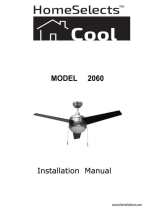 HomeSelects 2060 Installation guide
HomeSelects 2060 Installation guide
-
CONCORD 52HED Owner's Manual and Installation Instructions
-
HomeSelects 2052 Installation guide
-
CONCORD Calavera 52CAL Owner's manual
-
KMC KMC080 Operating instructions
-
Fanimation Edgewood Median TF300 Owner's manual
-
Design House 153791 Installation guide
-
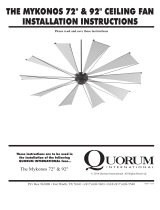 Quorum International Mykonos 72" Installation Instructions Manual
Quorum International Mykonos 72" Installation Instructions Manual
-
Design House 152991 Installation guide






















